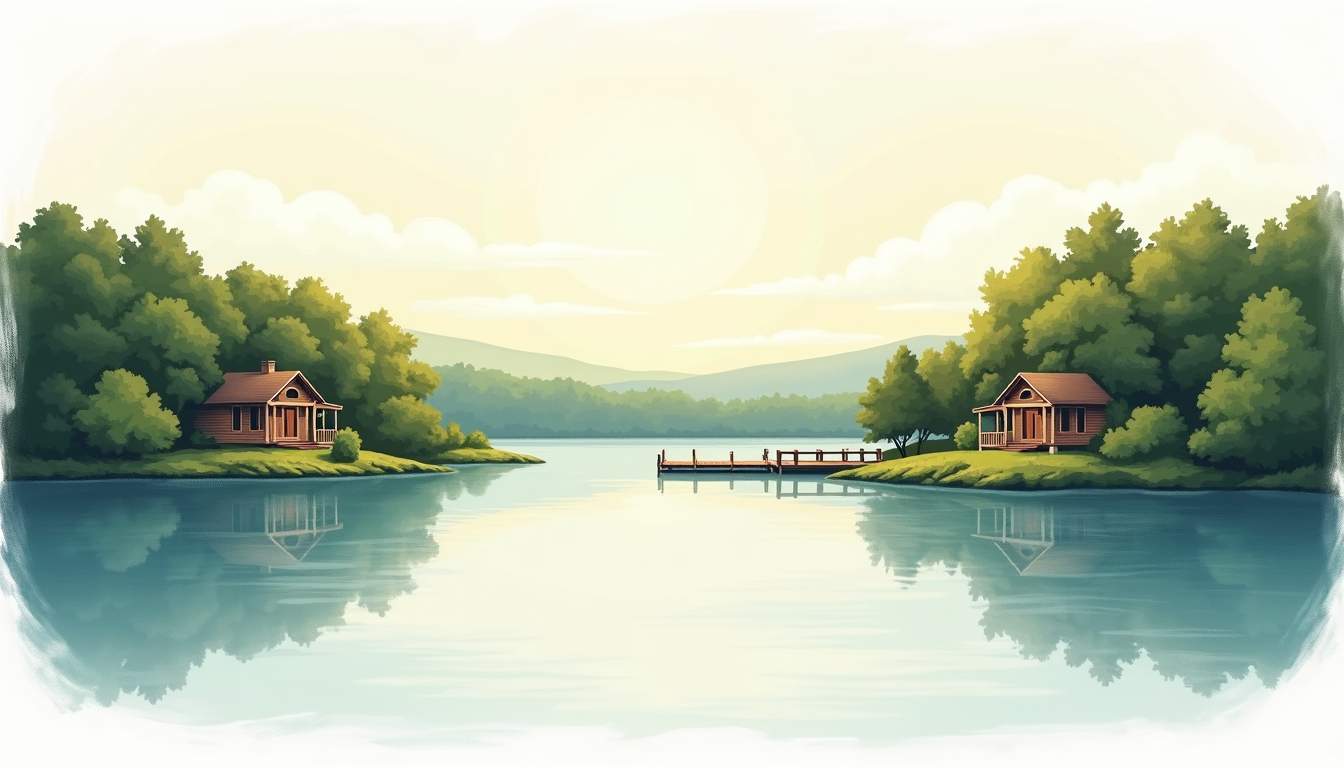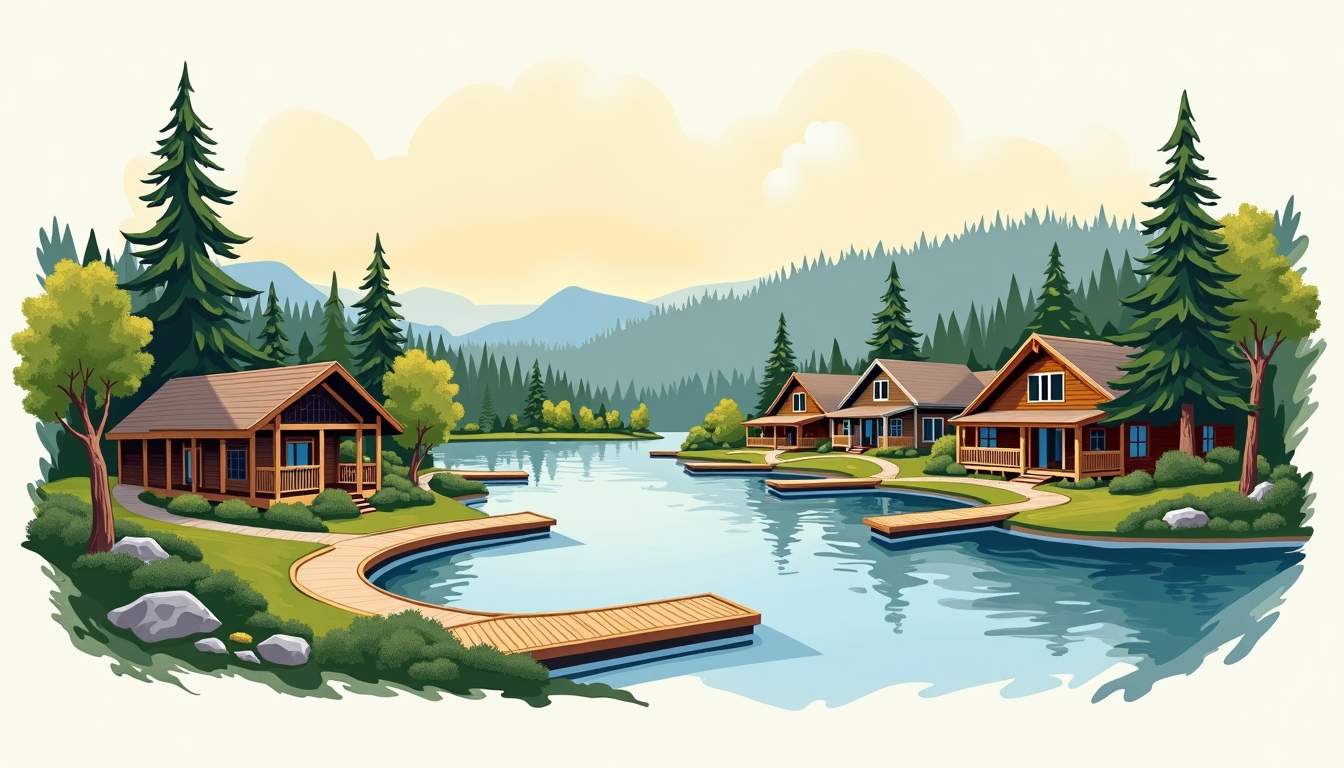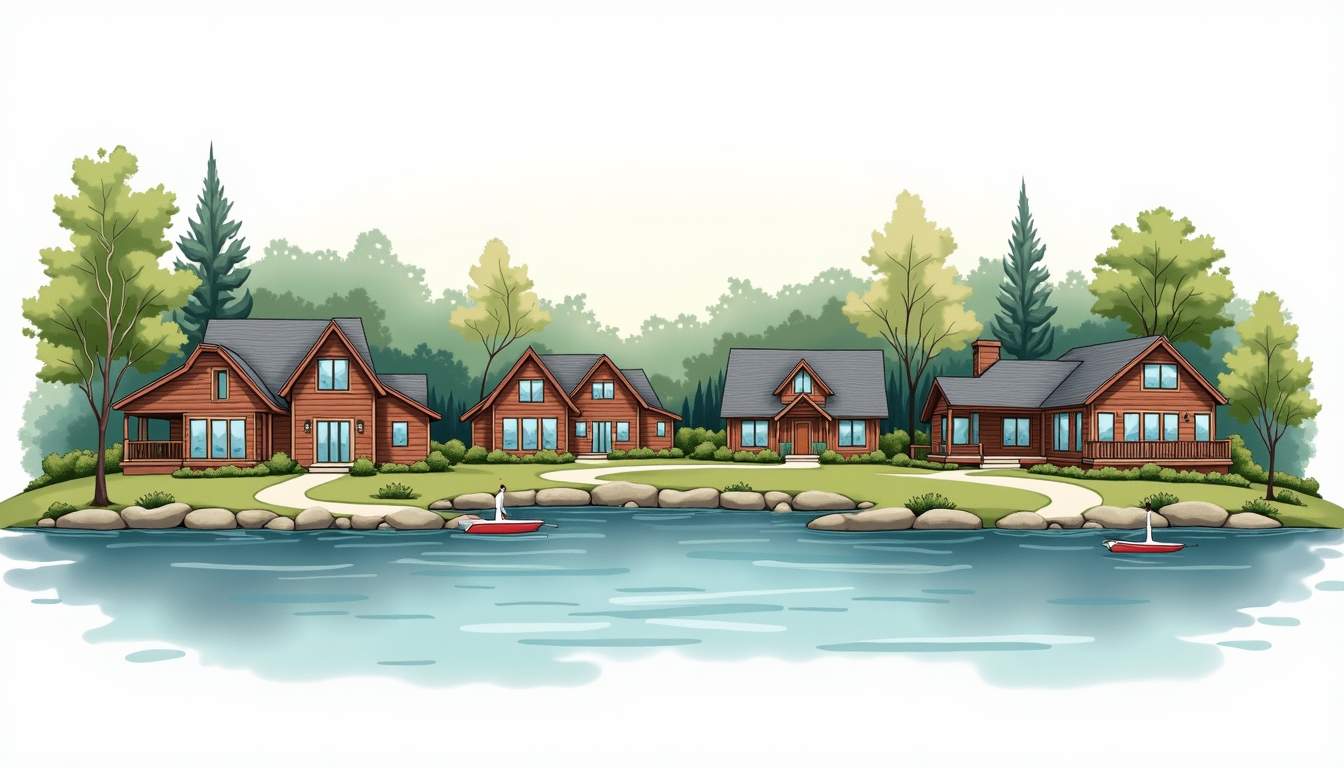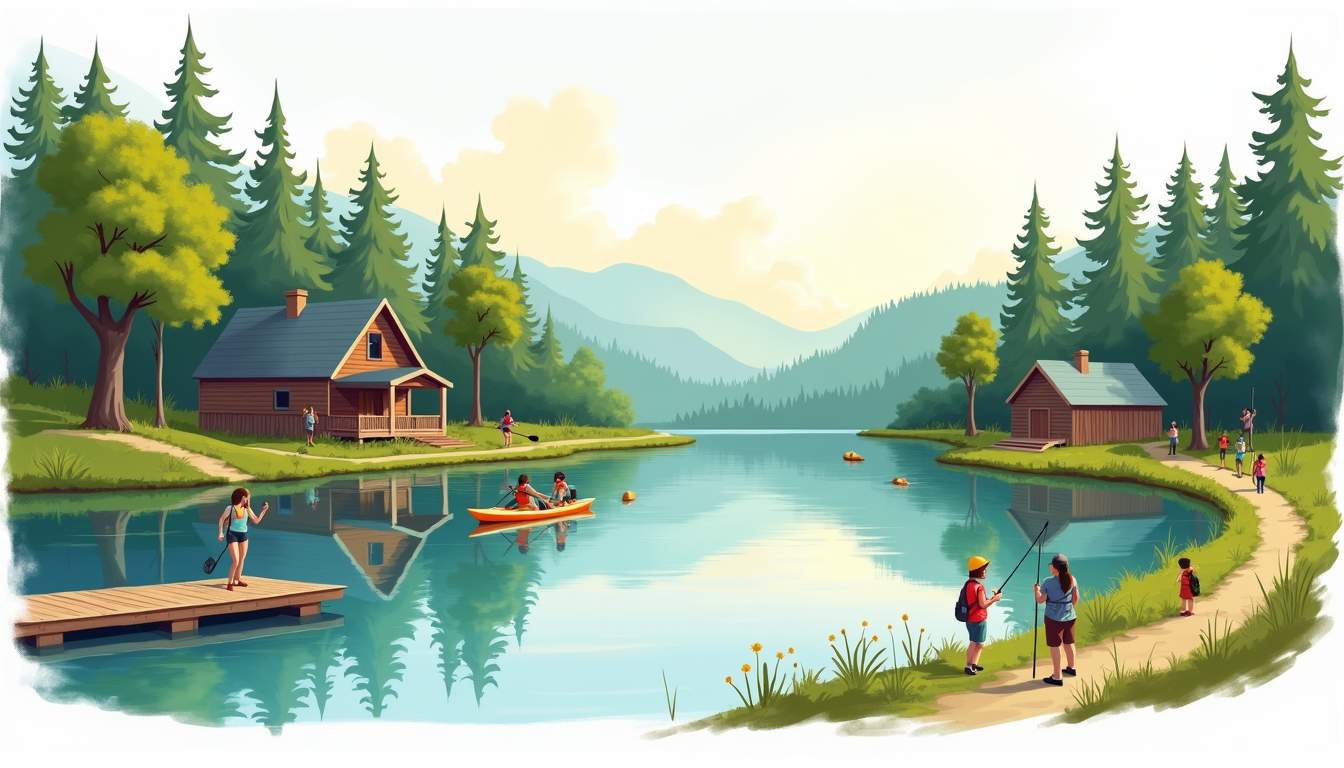
Discover the appeal of waterfront living in Tennessee through a practical, friendly guide to lakeside communities. This article explores lifestyle, housing, recreation, costs, and neighborhood dynamics so prospective residents and visitors can get a clear picture of what life by the water here entails.
Tennessee offers a unique blend of natural beauty, moderate climate, and accessible outdoor recreation. Lakes carved by rivers and reservoirs create miles of shoreline, providing quiet coves, boating lanes, and panoramic views that change with the seasons.
For many, the water acts as a focal point around which daily life and weekend plans revolve. Morning routines may include coffee on a dock, while evenings bring sunsets over rippling water. That connection to nature is a strong draw for families, retirees, and anyone seeking a slower pace.
Beyond the scenic vistas, lakeside communities in Tennessee often foster a strong sense of camaraderie among residents. Local events like fishing tournaments, paddleboarding clinics, and lakeside festivals offer opportunities to engage with neighbors and celebrate the outdoors. Additionally, the proximity to well-maintained hiking trails and wildlife preserves means residents can easily immerse themselves in the region’s rich biodiversity.
Moreover, Tennessee’s lakeside locations provide practical benefits as well. The moderate climate ensures that many outdoor activities can be enjoyed year-round without extremes of heat or cold. Many properties come with private docks or easy access to marinas, enhancing convenience for boating enthusiasts. This combination of lifestyle, recreation, and community makes lakeside living in Tennessee an appealing choice for a diverse range of people.
Lakeside communities in Tennessee range from small, secluded hamlets to planned developments with shared amenities. Some neighborhoods center on private docks and boat slips, while others emphasize trails, communal green space, and social clubs.

Smaller communities often feature individual cottages or cabins clustered near the shore. These neighborhoods favor privacy and a rustic aesthetic, with mature trees, narrow lanes, and limited commercial development. Social life tends to be neighborly and informal.
Larger developments might include marinas, community pools, fitness centers, and waterfront restaurants. These areas appeal to buyers seeking convenience and social programming, often providing homeowner association management and regular events to foster community engagement.
Some lakeside villages blend residential, retail, and recreational spaces, creating walkable neighborhoods with boutiques, cafes, and summer festivals. These locations are attractive to those wanting a lively atmosphere without sacrificing waterfront access.
Homes near Tennessee lakes span a range of styles and price points, from modest cabins to custom-built, contemporary lakehouses. Many properties emphasize outdoor living, offering large decks, screened porches, and walls of glass that frame water views.

Renovated older homes may retain traditional wood siding and stone accents, while new constructions often push toward modern lines and energy-efficient systems. Buyers can prioritize features like boat slips, flood resilience, and low-maintenance landscaping.
Purchasing a lakeside property can be an investment in lifestyle and long-term value, but upfront costs and maintenance responsibilities increase. Renting a waterfront home or cabin provides flexibility for seasonal stays or trial living without the commitment of ownership.
Lot size, shoreline access, and topography are critical. Gentle slopes make for easier access to the water, while steep drop-offs may require additional infrastructure. Shoreline erosion, riparian rights, and local regulations often influence development options and costs.
Lakes in Tennessee support a wide range of activities year-round. Boating, kayaking, paddleboarding, and fishing are staples during warmer months. Many lakes also offer hiking and biking trails that thread through woodland parcels along the water’s edge.

Seasonal pursuits such as birdwatching, photography, and quiet shoreline picnics draw visitors during shoulder seasons, while mild winters keep opportunities alive for scenic drives and community events.
Marinas provide more than boat storage; they often include fuel docks, repair services, and rental options for pontoons, jet skis, and fishing boats. Access to well-maintained slips and safe launching ramps is a central consideration for boating enthusiasts.
Tennessee lakes host diverse fish populations, including bass, crappie, and catfish. Shore anglers and boaters alike can enjoy productive outings. The lakeside environment also supports mammals, amphibians, and migratory birds, making it a rewarding setting for wildlife observation.
Living on the lake involves practical decisions that differ from typical inland properties. Utilities like septic systems, well water, and electrical servicing must be evaluated carefully. Some remote parcels require septic upgrades or alternative water solutions.
Insurance for waterfront properties is another important factor. Standard homeowner policies may need endorsements for flood coverage, and the cost varies based on elevation, shoreline protection, and local floodplain maps. It is wise to compare quotes and understand coverage nuances.
Dock upkeep, shoreline stabilization, and erosion control are recurring tasks. Routine inspections of boat lifts and electrical systems help prevent costly problems. Landscaping often prioritizes native plants that tolerate shoreline conditions while minimizing maintenance and supporting local ecology.
Many lakeside neighborhoods operate under covenants that govern dock construction, boat storage, and exterior architecture to protect views and property values. Prospective residents should review HOA rules and fee structures before committing to a purchase.
Waterfront property typically commands a premium over inland homes, reflecting the scarcity of shoreline and the desirability of views and access. Prices vary widely by lake, proximity to metropolitan areas, and the level of community amenities.
Long-term value often correlates with good management of common areas, strong local economies, and accessibility. Properties with well-built shoreline protection and thoughtful landscaping tend to retain value better in the face of environmental changes.
Beyond mortgage payments, residents should budget for higher insurance premiums, dock and boat maintenance, and potential HOA fees. Utilities might be more expensive in remote locations, and winterization for plumbing and boats is an additional seasonal cost.
Rental income can offset ownership costs when properties are available for short-term leases. Local regulations on rentals differ, so understanding zoning and permitting rules helps maximize rental potential while staying compliant.
Community life around lakes can be vibrant, with seasonal festivals, farmers’ markets, and volunteer associations that maintain trails and organize cleanups. These activities foster a sense of stewardship and social connection among residents.
Safety is a shared responsibility. Lifesaving stations, clear signage, and community education about water safety make a positive difference. Local volunteer fire departments and rescue teams frequently coordinate with state authorities for emergency response plans.
Proximity to quality schools and healthcare centers matters for families and retirees alike. Some lakeside communities are within easy driving distance of urban centers, while others require more travel. Commute times and access to essential services should be factored into location decisions.
The cultural rhythm of lakeside towns often aligns with seasonal tourism, marked by summer weekends at the marina and quieter winter months ideal for maintenance and reflection. Local artisans, eateries, and music scenes contribute to a distinct regional character.
Protecting water quality and shoreline ecosystems is central to the long-term health of lakeside communities. Best practices include minimizing fertilizer use, maintaining natural vegetation buffers, and implementing low-impact landscaping to reduce runoff.
Community-led initiatives, such as lake monitoring programs and invasive species management, help preserve recreational value and biodiversity. When residents collaborate with local authorities, lakes remain resilient and enjoyable for future generations.
Choosing native plants and permeable surfaces can reduce erosion and filter pollutants before they reach the water. Rain gardens and riparian buffers are practical measures that enhance biodiversity while protecting property.
Modern lakeside homes increasingly incorporate energy-efficient HVAC systems, solar arrays, and high-performance windows that reduce energy use while preserving views. Sustainable design reduces ongoing costs and supports environmental goals.
Selecting the right lakeside neighborhood starts with lifestyle priorities. Consider how much time will be spent on the water, the desired level of social activity, and the importance of nearby services. Walkability, dock access, and neighborhood rules should align with personal preferences.
Visit during different seasons to understand noise levels, traffic, and weather-driven changes in use. Speak with neighbors and local officials to gain practical insights about maintenance, safety, and community culture before signing on the dotted line.
Key items include verifying shoreline access, understanding flood maps, reviewing HOA documents, comparing insurance options, and evaluating proximity to essential services. A professional home inspection that includes docks and seawalls is essential.
New residents often find that volunteering for local events and joining social groups accelerates integration. Learning about seasonal rhythms and contributing to lake stewardship projects strengthens connections and ensures a positive experience for everyone.
Lakeside living in Tennessee offers a compelling mix of tranquility, recreation, and community. With thoughtful planning around finances, maintenance, and environmental stewardship, living by the water can enhance quality of life without sacrificing practicality.
Whether seeking a year-round residence, a seasonal escape, or an investment property, the variety of lakeside communities across Tennessee provides many possibilities. Careful research, site visits, and conversations with local residents will help identify the right retreat for a waterfront lifestyle.
Ready to embrace lakeside living at its finest? Tennessee National offers a luxury gated community experience complete with a Greg Norman Signature Golf Course, private marina, waterfront dining, and over 20 exclusive amenities. Whether you prefer a move-in ready home or a custom build, our picturesque setting and vibrant social life provide the perfect backdrop for your waterfront retreat. Schedule a Private Tour today and start making memories every day by the water.